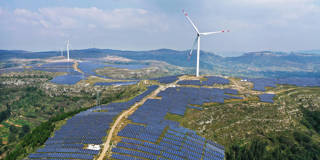In economists' ideal world, humanity would fight climate change through a globally coordinated set of non-discriminatory trade policies. But in the world as it is, our only chance to ensure a sustainable future depends on letting governments pursue environmental goals independently, regardless of the impact on other countries.
CAMBRIDGE – Late last month, a foreign leader accused US President Joe Biden of pursuing “super aggressive” industrial policies. It was not Russian President Vladimir Putin or Chinese President Xi Jinping, whose countries are America’s main geopolitical rivals. Nor was it Iranian President Ebrahim Raisi or Venezuelan President Nicolás Maduro, whose countries have struggled under the weight of US-led sanctions.
No, the complaint came from French President Emmanuel Macron, a US ally, about the Inflation Reduction Act, Biden’s landmark initiative to decarbonize the American economy by subsidizing domestic investment in electric vehicles, batteries, and other renewable technologies. Qualifying for these subsidies requires firms to source critical inputs from US-based producers, which irks Macron and other leaders, who claim that the new legislation undermines European industry. France, Macron noted, faces challenges of its own generating middle-class jobs. “And the consequence of the IRA,” he put it bluntly, “is that you will perhaps fix your issue but you will increase my problem.”
Imposing costs on other countries while addressing climate change is, however, precisely what the European Union has been planning to do. Through its carbon border adjustment mechanism (CBAM), the EU will soon impose duties on certain carbon-intensive imports. The goal is to maintain a high domestic price for carbon without allowing foreign firms to undercut European producers through cheaper imports. But the import duties will also hurt many lower-income countries such as Mozambique, Egypt, and India.

CAMBRIDGE – Late last month, a foreign leader accused US President Joe Biden of pursuing “super aggressive” industrial policies. It was not Russian President Vladimir Putin or Chinese President Xi Jinping, whose countries are America’s main geopolitical rivals. Nor was it Iranian President Ebrahim Raisi or Venezuelan President Nicolás Maduro, whose countries have struggled under the weight of US-led sanctions.
No, the complaint came from French President Emmanuel Macron, a US ally, about the Inflation Reduction Act, Biden’s landmark initiative to decarbonize the American economy by subsidizing domestic investment in electric vehicles, batteries, and other renewable technologies. Qualifying for these subsidies requires firms to source critical inputs from US-based producers, which irks Macron and other leaders, who claim that the new legislation undermines European industry. France, Macron noted, faces challenges of its own generating middle-class jobs. “And the consequence of the IRA,” he put it bluntly, “is that you will perhaps fix your issue but you will increase my problem.”
Imposing costs on other countries while addressing climate change is, however, precisely what the European Union has been planning to do. Through its carbon border adjustment mechanism (CBAM), the EU will soon impose duties on certain carbon-intensive imports. The goal is to maintain a high domestic price for carbon without allowing foreign firms to undercut European producers through cheaper imports. But the import duties will also hurt many lower-income countries such as Mozambique, Egypt, and India.